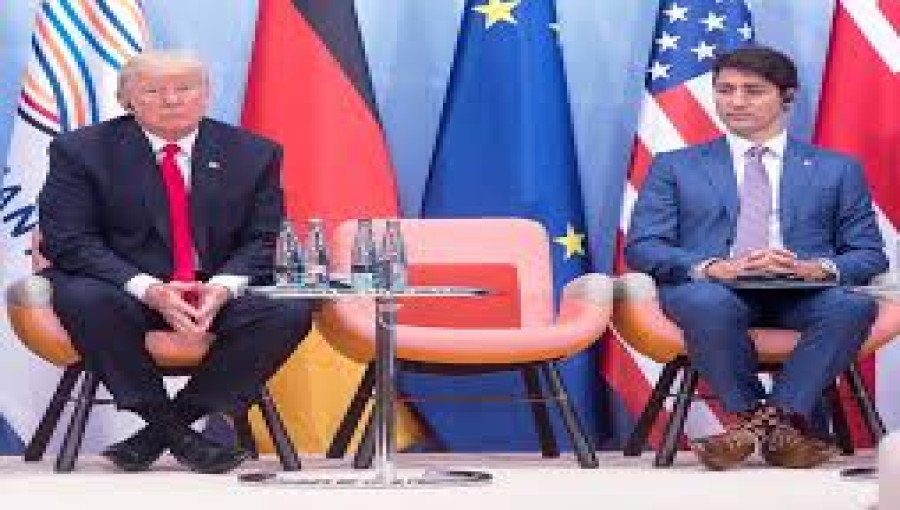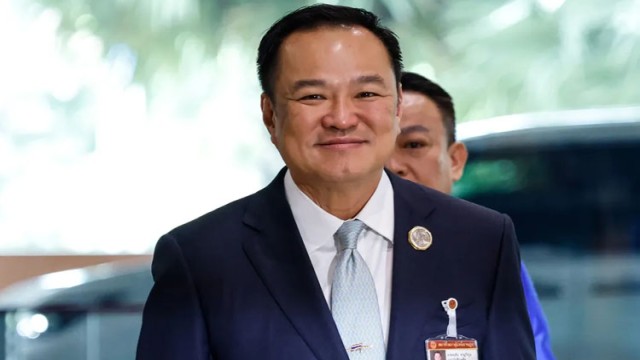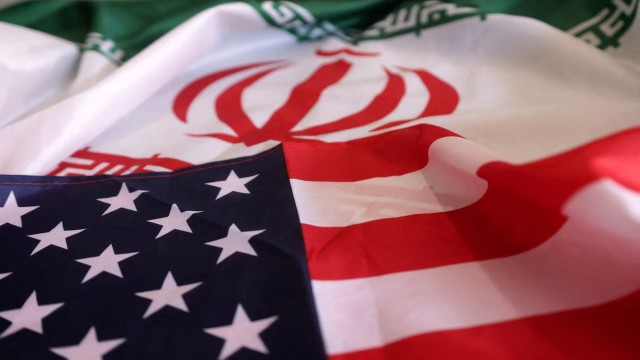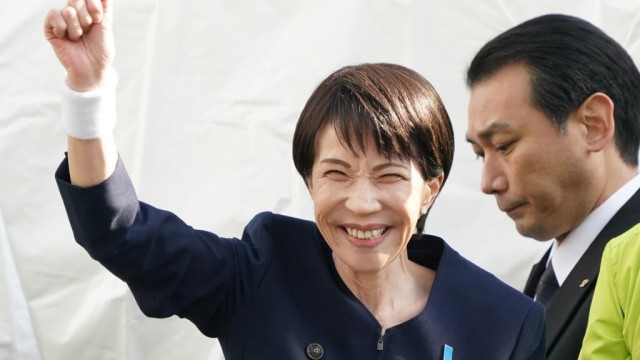New York, Dec 19, (V7N) - Donald Trump, the president-elect of the United States, has been stirring political unrest in Canada, intensifying a crisis that could lead to the ousting of Prime Minister Justin Trudeau. Trump’s intervention in Canadian affairs, particularly his threats of 25% tariffs on Canadian goods, has destabilized the political landscape in Ottawa, resulting in significant ramifications for the Liberal government. This marks a preview of a more confrontational approach Trump is likely to adopt in his second term, one that could have consequences for global alliances, including Canada's relationship with the U.S.
Tariffs and Their Impact on Trudeau's Government
Trump’s imposition of tariffs on Canadian goods is part of a broader strategy to exert pressure on Canadian leaders, particularly on issues such as border security and trade relations. Trudeau, already struggling with low approval ratings, now faces the looming threat of a recession as a result of Trump's policies. The Prime Minister has been embroiled in a series of domestic political battles that were exacerbated by Trump’s actions. Trudeau's government is already trailing the opposition Conservatives by a significant margin, and with an election approaching in the fall, his position is looking increasingly precarious.
One of the most significant blows to Trudeau's authority came this week with the resignation of Finance Minister and Deputy Prime Minister Chrystia Freeland. Freeland, a long-time Trudeau ally, publicly criticized the Prime Minister's leadership just hours before a critical budget statement was due in Parliament. Her resignation letter highlighted concerns about the growing threat posed by Trump’s economic nationalism and the need for Canada to be prepared for a potential tariff war. Freeland argued that Canada could no longer afford “costly political gimmicks” and needed to adopt more serious fiscal policies to weather the looming storm.
Trump's Influence on Canadian Political Dynamics
Trump’s actions and rhetoric have deeply polarized Canadian politics. His threats and the resignation of Freeland have worsened internal divisions within the Canadian government, and speculation is growing about whether Trudeau will step down before the upcoming election. Political observers, such as Matthew Lebo from McGill University, argue that Trump’s intervention has altered the political conversation in Canada, making it less likely that Trudeau will remain in power. In fact, Lebo suggests that the timing of the election and the future of Trudeau’s leadership may be directly influenced by Trump’s policies and actions.
For Trump, this situation has been politically advantageous. He has been able to damage his political foes in Canada, including Freeland, who had clashed with him during trade negotiations in his first term. Trump's derogatory remarks about Freeland and his ongoing criticisms of Trudeau reflect his disdain for both leaders, whom he views as weak and overly progressive. Through his actions, Trump has managed to destabilize Canada’s political unity, exploiting existing tensions between key political figures.
Trade and Economic Power
Trump’s strategy towards Canada is a reflection of his broader worldview, which treats foreign policy as a series of transactional disputes rather than a cooperative effort. His aggressive stance on trade, including the threat of tariffs, plays directly into his belief that the U.S. is being taken advantage of by other countries, particularly in North America. For Trump, every international relationship is a win-lose situation, and he sees trade agreements, such as the USMCA (formerly NAFTA), as tools to extract concessions from his neighbors.
In his most recent statements, Trump emphasized that the U.S. has been "subsidizing" both Canada and Mexico and that these relationships must be redefined for the benefit of American interests. This rhetoric resonates with many of Trump’s supporters, especially those in economically struggling regions of the U.S., where resentment over trade deals like NAFTA has been a major political issue. While the specifics of his criticisms—such as referring to the U.S. subsidizing other countries—are vague, his underlying message is clear: Trump believes that the U.S. must secure better deals, even if it means jeopardizing existing relationships.
Canada’s Political Response and Regional Divisions
The potential economic fallout from Trump’s tariffs has created further divides within Canada. Leaders in different provinces have expressed conflicting opinions on how to respond to Trump’s threats. Ontario Premier Doug Ford, for example, has suggested that Canada could use its energy exports, particularly oil, as leverage against the U.S. However, this idea has been met with resistance from other political leaders, who argue that such actions would harm Canada’s economy and worsen tensions with the U.S. Ford’s position underscores the political complexity of managing relations with Trump, especially given the intertwined nature of the U.S.-Canada trade relationship.
Trump’s tariff threats and his broader approach to border security have also led to promises from Canada to invest more in border enforcement, such as increasing the number of personnel and improving security measures. However, critics argue that these concessions are insufficient in addressing the deeper issues at play, particularly the ideological and political divide between Trump and Canada’s current leadership.
Trump’s Global Strategy and the Impact on Allies
Trump’s hardline tactics are not limited to Canada. He is likely to pursue similar strategies with other countries, including European nations such as France, Germany, and the U.K. These nations, already dealing with internal political turmoil, could become targets of Trump’s divisive tactics. French President Emmanuel Macron, for example, has been embroiled in a domestic political crisis, while Germany’s Chancellor Olaf Scholz is facing increasing challenges within his own government. Trump’s approach to Canada serves as a blueprint for how he might seek to exploit political divisions within Europe to his advantage.
The rise of populist movements in Europe, as well as the growing influence of leaders like British Prime Minister Keir Starmer, also presents an opportunity for Trump to further his agenda. Starmer’s government, despite its large majority, must navigate the complexities of post-Brexit Britain, which lacks the protection of the European Union’s collective bargaining power. Trump is likely to continue leveraging his power to create friction between European nations and, potentially, to align with populist leaders who share his nationalist views.
Conclusion
Trump’s involvement in Canadian politics is a glimpse into what his second term could look like. His hardline stance on trade, his willingness to meddle in the domestic politics of allies, and his divisive rhetoric are shaping global relations in ways that may have profound implications for U.S. foreign policy. While Canada and its allies may attempt to navigate these challenges, they must be prepared for the potentially disruptive tactics that Trump will employ as he seeks to assert U.S. dominance on the world stage. For now, Canada is grappling with the political and economic consequences of Trump’s actions, and the full impact of these developments will only unfold in the months and years to come.
END/SMA/AJ/































Comment: